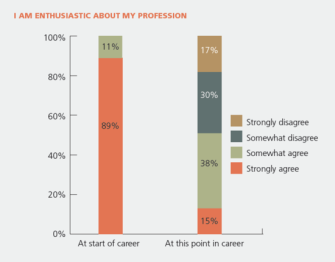When schools implement new initiatives, teachers want to have thoughtful professional development as support. And not having such aid can be a huge source of stress, according to a new survey of teacher working conditions. But there are a lot of other stresses teachers face, too, the survey shows.
The 1.6-million member American Federation of Teachers worked with the Badass Teachers Association (a group opposed to corporate-driven education reform) to survey educators on workplace conditions; they released the results Tuesday. The groups hope to use the survey to convince the U.S. Department of Education to help lead a scientific study on working environments in schools. Teacher working conditions are a well-documented factor in teacher retention, and employee health, too.
“If we don’t do something about this, we will lose a generation of teachers,” AFT president Randi Weingarten said on a press call Tuesday. “And if we do that, we will lose a generation of students.”
Among the most major on-the-job stressors the surveyed teachers cited are improper professional development around new initiatives, negative media portrayals, and uncertain job expectations:

By “new initiatives,” I’d guess at some least percentage of respondents are thinking of Common Core State Standards, which have been implemented in an uneven manner across the several dozen states that adopted them.
A lot of teachers have issues with how the media portray teaching. (Teachers are going to remember that one Time Magazine cover for a while.) This part probably depends on media consumption, though; it’s easy to end up in an echo chamber on Facebook or Twitter. But the media are not a monolith.
Some other findings:
- Among teachers who say they’ve been bullied, 58 percent identified administrators as perpetrators, while 38 percent indicated coworkers.
- 45 percent of teachers say they don’t get adequate bathroom breaks.
- 79 percent of teachers don’t feel respected by elected officials.
- 14 percent of respondents are very likely to look for employment outside the education field next year (but 26 percent are somewhat likely to do so, per an AFT spokesperson).
And then there’s this one:

Roughly half of teachers aren’t enthusiastic about teaching.
The survey received responses from over 30,000 educators, primarily gathered through email campaigns to their memberships and another union group’s, the American Federation of State, County, & Municipal Employees. It’s not a scientific survey, which the organizations admit. And it probably carries a heavy bias, since the lead groups put a lot of emphasis on how teachers are mistreated; participants may be primed to feel negative toward the teaching profession. But that doesn’t mean their concerns aren’t valid, either.
Another caveat to the survey: While the racial and gender demographics reflected the teaching profession (mostly white, mostly female), the amount of experience did not. Only 24 percent respondents had worked in education for 10 years or less, while 38 percent had 11-20 years of experience, and the remaining 38 percent had more than 20 years of experience. Yet according to the most recent available data from the National Center for Education Statistics, only 20 percent of teachers have more than 20 years of teaching experience, and 42 percent of teachers have 10 years or less of experience. So the AFT/BAT survey skews significantly older than the teaching workforce.
A University of Phoenix poll released last week found that nine out of 10 teachers were satisfied with their jobs, and 68 percent would recommend the teaching profession to others.
Charts: AFT/BAT
More on teachers’ feelings toward their profession: